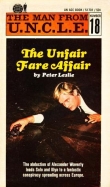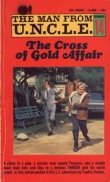
Текст книги "The Masuda Affair "
Автор книги: Ingrid J. Parker
Жанр:
Исторические детективы
сообщить о нарушении
Текущая страница: 2 (всего у книги 21 страниц)
The Courtesan’s House
He recognized it immediately: the brown and white fur arranged in irregular patches; the scarred face with one eye half closed so that it seemed to be winking; the tear in the right ear. It sat on an upturned basket behind a vegetable stall, looking at him and twitching its tail.
Perhaps it was the festival’s peculiar atmosphere, or his own confused emotions, but Akitada was suddenly convinced that the cat was his link to the boy. This time he knew better than to rush the animal. He approached slowly, making soft clicking noises with his tongue as he had heard his sisters do when they called their kitten. The cat winked, slipped down from the basket in one fluid motion, and strolled away.
Akitada followed, keeping his distance, waiting as the animal stopped to examine garbage in gutters and alleyways for bits of food. He had no idea what he would do if he caught the cat, and he did not worry about the peculiar figure he made, following a mangy cat up and down dark alleys in his heavy silk hunting robe and stiff hat. At one point the cat paused to consume a large fish head someone had tossed out of a restaurant. Akitada hurriedly purchased a lantern from the shopkeeper next door, overpaying the man in his haste not to lose the cat. Eventually, the animal stopped scavenging and moved on more purposefully.
They left the business district behind. The streets grew darker, there were fewer people about, and the sounds of the market receded until they were alone on a residential street, the cat a pale shadow in the distance. A pearly moon cast its uncertain light as remnants of clouds moved slowly across it. Akitada picked up his pace. Occasionally, the light of lanterns or torches inside a walled compound threw weird shadows through the intervening trees. Puddles still glinted here and there in the potholes and cart tracks of the road, and Akitada hoped it would not start to rain again. He had the strangest sense that he and the cat moved towards some unearthly place, that the cat was leading him among the ghosts. He was being foolish, but in his misery, he relinquished his common sense willingly. It was a faculty that had never been particularly useful when it came to human emotions.
The cat appeared to have a definite destination. It kept up a steady and direct route towards the lake. The streets became darker, the lights from dwellings fewer. When they reached the road along the lake, Akitada saw that the wealthy people of Otsu and summer visitors from the capital had built their villas here to catch the cool breezes and have a view of the distant mountains. Their gardens were large, and the walls and gates in good repair. The sweet scent of flowers came over the walls, made sweeter by the moisture which still lingered from the rain. Somewhere a reed warbler called and was answered. Charming rustic roofs peeked from the trees, or elegantly tiled ones, and occasionally, where a wall was low and the trees not dense, he caught a gleam of the moon-silvered lake.
Imperceptibly he relaxed and smiled to find himself on this adventure with a cat. Then, abruptly, the moon disappeared behind clouds, the street was plunged into sudden darkness, and he could no longer see the cat. When the moon came out again, he strained his eyes and started to run. The street lay before him, long, straight, and empty. The cat was gone. With a ghostlike suddenness it had disappeared into the darkness as if it had never been.
Akitada stopped and looked everywhere. Nothing. Panic rose for a moment, then abated into defeat. In the distance sounded a temple bell. He turned to go back to the inn.
When the ringing of the bell stopped, he heard the slow clacking of wooden sandals. An old man approached, paused, and produced a pair of wooden clappers which he beat together vigorously, calling out in a reedy voice, ‘The Rat … The hour of the rat … The Rat.’
A night watchman. And it was the middle of the night already. Most decent people were in their beds.
Akitada called out, ‘Do you happen to know who owns a brown-and-white cat hereabout?’
The watchman raised his lantern to look at him. ‘You mean Patch, sir? Nobody owns him. He lives in the dead courtesan’s house.’ The watchman pointed to the gate of one of the lakeside villas. ‘A visitor in town, sir?’ he asked.
‘Yes, a visitor.’ Akitada looked at the wall and gate and saw that it did not match the neat appearance of the rest of the street. Plaster had fallen, exposing the wood and mud construction, and in one place a large section had collapsed, mocking the heavily barred wooden gate by allowing easy access to cats and humans alike.
Patch? The cat was spotted. Surely, the boy had recognized the cat and tried to call its name. ‘The dead courtesan’s house?’ he asked the watchman, who seemed amused by the odd encounter on the moonlit street.
‘Nobody lives there anymore,’ the watchman said. ‘It’s a sad ruin. The cat belonged to her.’
‘Really? Who owns the property? I might want to buy it.’
‘Ah.’ The watchman’s curiosity was satisfied. The rich, not having regular work, kept peculiar hours, but that was not his concern. He shook his head. ‘Dear me, not that place, sir. She killed herself because her lover left her to starve. They say her angry ghost roams the garden to catch unwary men to have her revenge on. I never go near it myself’ He produced a wheezing laugh. ‘Not that she’ll have much use for an old stick like me, but you’d better keep your distance, sir.’
Akitada looked at the watchman. It was the middle of the O-bon festival, and the old man was clearly superstitious, but somehow the tale of a haunted house fitted his own mood. ‘How did she die?’
‘Drowned herself in the lake. Pity. They say she was a rare beauty.’
‘Were there any children?’
‘If so, they’re long gone. The house belongs to the Masudas now.’
Akitada thanked him, and the man resumed his rounds, making a wide detour around the broken wall and barred gate.
Akitada walked to the collapsed wall and peered into the overgrown garden. Trees and shrubs hid all but the corner of an elegantly curved roof. Up ahead the night watchman looked back and shook his head at such foolhardiness. Akitada waved and waited for him to disappear before scrambling over the rubble into the garden. He was trespassing and felt foolish, but was more determined to find the cat than ever.
A humid, stagnant atmosphere received him. Dripping vines, brambles, and creepers covered shrubs and trees. His feeble lantern gilded wet leaves and picked out a stone Buddha, half-hidden beneath a blanket of ivy. Strange rustlings, squeaks, and creaks sounded everywhere, and clouds of small gnats hovered in the beam of his light. The air was oppressive and vaguely threatening. The cat’s coming and going had left a narrow track which soon disappeared under dense vegetation. Akitada followed it, but had to take detours and lost the way. His progress was noisy with snapping twigs, and he wondered vaguely about the neighbors. Surely no one else was out at this time. When he felt a tug at his sleeve, he swung around, his heart beating, but he had only brushed the branch of a gaunt cedar.
He would have turned back, if he had not heard the sound of a door or shutter slamming. Perhaps it had been the cat, or some beggar finding refuge in the deserted house, or even the wind from the lake beyond, but it was enough to make Akitada press on.
When he reached the house, he was covered with scratches, itching from insect bites, and his topknot was askew. But there, on the veranda, sat the cat, waiting.
The villa looked small, dark, and empty, its shutters broken, the paper covering its windows hanging in shreds, and many of its roof tiles had shattered on the ground. The balustrade of the veranda leaned at a crazy angle, and where there had been doors, black cavernous spaces gaped in the walls. It must have been charming once, poised just above the lake in its lush gardens, a nobleman’s retreat from official affairs in the capital, or – as the watchman had implied – his secret love nest.
The lake stretched, dull silver, towards a distant shore that wore a necklace of tiny lights. People were still welcoming the return of their dead. Here, in this dark and deserted villa, no one had lit candles or set up an altar to welcome the spirit of the unhappy woman who used to live in it. Only the water lapped gently among the reeds along the bank, but Akitada suddenly felt a ghostlike presence and shivered. He looked about, then walked up to the ruined house. The cat watched him with unblinking eyes, motionless until he was close enough to touch it. But when he stretched out a tentative hand, it slipped away and disappeared inside. He called its name softly, but the animal did not reappear.
The veranda steps were missing, as was most of the floor. The house, which had been vandalized for useful building materials, had become inaccessible to all but cats. He was turning away, when he heard an eerie sound from inside, a soft wail definitely not made by a cat. He swung around and caught a movement inside.
He thought a tall pale shape – a woman trailing some diaphanous garment? – had moved past the opening to one of the corner rooms. Akitada felt the hair bristle on his neck and called out, ‘Who’s there?’ He got no answer.
Walking quickly around the corner of the house, he climbed one of the supports of the veranda and held up his lantern. He directed its beam into the room where he had seen the woman. It was empty. Dead leaves lay in the corners, and rainwater had gathered in puddles on the remaining floor. In spite of the warm and humid night, Akitada felt a sudden chill.
When he jumped down from his perch, his foot landed on something that broke with a sharp crack. The lantern revealed a shimmer of black lacquer and mother-of-pearl: a wooden toy sword, proof that a small boy had once lived here. He picked up the hilt and choked with pain; the sword was identical to the one he had bought Yori during the last winter of his life. A costly toy, it had been lacquered and ornamented to resemble the weapon of an adult. Yori’s delight in it, and the times they had spent practicing swordplay in the courtyard at home, had been more than worth the expense. When the memory faded into the familiar bitterness, an irrational fear gripped Akitada. He stumbled away from the haunted villa, plunging back into the wilderness. He scrambled through as fast as he could, and when he reached the broken wall again, his heart was pounding and he was out of breath.
The street lay empty, the watchman long gone. Dejected, Akitada returned to the inn. He was no closer to helping the boy or making sense of what was troubling him. A courtesan’s ghost, a feral cat, and an expensive toy? What did they mean? He was too weary to think.
In spite of his exhaustion, he slept poorly. The encounter with the child had brought back all the old grief and added new fears. He lay awake for a long time, thinking that he had abandoned the boy to his fate without lifting a finger to help him and remembering the guilt of having neglected his own son during the time of the pestilence. When he finally fell asleep, his dreams were filled with snarling cats and hungry ghosts. The ghosts had the face of the boy and followed him about, their thin arms stretched out in entreaty.
Towards dawn he woke, drenched in sweat, certain that he had heard Yori cry out for him from the next room. For a single moment of joy he thought his son’s death part of the dream, but then he felt the tears on his face and knew he was gone. The dark and lonely room of the inn closed in around him, and he plunged back into despair.
Waking was always the hardest.
The final day of the O-Bon festival dawned clear and dry. If the weather held, Akitada could reach the capital in a few hours’ ride, but he decided to chance it and spend the morning trying to find out more about the boy, the cat, and the dead courtesan. He thought, half guiltily and half resentfully, of his waiting wife, but women seemed to draw on inner strengths when it came to losing a child. In the months since Yori’s death, Tamako had quietly resumed her daily routines, while he had sunk into despair.
The sun sparkled off the waters of the lake, and behind him rose the green mountains, Hieizan towering above the rest. The surface of the lake was dotted with slender fishing boats and the large white sails of ships making their way both north and south, carrying goods and people. Otsu was a harbor for the capital and bustled with business. Today was the day of parting from the dead for another year.
Akitada set his mind on the needs of the living, on a small deaf-mute boy who might have a connection with an abandoned villa belonging to the Masudas. He left the business streets of the town behind and climbed the road to the green hillside overlooking it.
The curving roofs of the Masuda mansion rose behind a high wall. Its large gate was closed, in spite of the festival. Perhaps the Masudas feared their ghosts. Akitada rapped sharply. A window in the porter’s lodge slid open, and a very old man peered out. Akitada gave his name, adding, ‘I’m calling on Lord Masuda.’
‘The master’s not well. He sees no one,’ wheezed the ancient one.
‘Then perhaps one of the ladies will receive me?’
The window grate slid shut and there was the sound of steps shuffling off. After a moment, the gate creaked open, and Akitada was admitted to a large courtyard covered with gravel and shaded by trees. The splendor of the mansion amazed him. Blue tiles gleamed on the roofs, red and black lacquer covered doors and pillars, and everywhere he saw carvings, gilded ornaments, and glazed terracotta figures.
The old man led the way. They climbed the wide stairs of the main building and passed through it. Akitada caught glimpses of a painted ceiling supported by ornamented pillars, of thick grass mats and silk cushions, and of large, dim scroll paintings. Then they descended into a private garden. A covered gallery led to a second, slightly smaller hall. Here the old servant asked him to wait.
Akitada stood in the gallery and looked about him. This world was beautiful and remote from the bustle of the streets of Otsu and from the ragged boy. Great wealth had raised these many tiled roofs with their carved eaves and lacquered columns. Great wealth and exquisite taste had laid out the gardens that surrounded the halls and pavilions. But where were the maids, gardeners, stable boys, sweepers, cooks, carpenters, and pages who tended all this? The grounds were too quiet, almost deserted, though the buildings and the garden seemed in good repair.
An artificial stream babbled softly past the gallery where he stood, then disappeared behind a small hill and reappeared again, spanned by an elegantly arched red-lacquered bridge. Akitada stepped to the railing to look down into a small pond. Its clear water was quite deep. A frog, disturbed by Akitada’s shadow, jumped in and sent several fat old koi into a mild frenzy.
The sound of children’s laughter came from the garden, and two little girls skipped across the bridge, as colorful as butterflies in their silk gowns, their voices as high and clear as birdsong. A nurse in black followed more slowly.
Lucky children, Akitada thought bitterly, and turned away. And lucky parents!
The old porter returned eventually and took him to a beautiful room. Two ladies were seated on the pale grass mats near open doors. Both wore expensive silk gowns, one the dark grey of mourning, the other a cheerful deep rose. The lady in grey, slender and elegant, seemed to be making entries in a ledger; the other, younger lady had the half-opened scroll of an illustrated romance before her. The atmosphere was feminine, the air heavily perfumed with incense.
The lady in grey was no longer in her first youth, but still very handsome. She regarded Akitada for a moment, then made him a slight bow from the waist and said, ‘You are welcome, My Lord. Please forgive the informality, but Father is not well and there was no one else to receive you. I am Lady Masuda, and this is my late husband’s other wife, Kohime.’
Kohime smiled. She had a cheerful plain face and the robust body of a peasant girl. Akitada decided to address the older woman. ‘I am deeply distressed to disturb your peace,’ he said, ‘And regret extremely the ill health of Lord Masuda. Perhaps you would like me to return when he is better?’
‘I am afraid Father will not improve,’ said Lady Masuda. ‘He is old and … his mind wanders. You may speak freely.’ She gestured towards a cushion. Akitada sat down. She nodded at the account book. ‘Circumstances force me to take responsibility for running this household.’
Akitada glanced again at Lady Kohime, who nodded and said in a high, childish voice, ‘Hatsuko is so clever. She can handle anything.’
So these two women were the old lord’s daughters-in-law, and of the two, Lady Masuda had assumed the role of steward. She was apparently a remarkably capable and serious person. Lady Kohime, by contrast, smiled at him like a child who has been given an unexpected treat.
Accepting Lady Masuda’s reticence, Akitada moved cautiously. He praised the town and its surroundings, and then expressed an interest in buying a summer place on the lake. He mentioned the beautiful setting and the fact that it was within easy reach of the capital. Lady Masuda listened politely, but he saw that her fingers moved nervously in her lap. Akitada got to the point. ‘I was told that the Masudas own the abandoned villa on the water. The property would suit me perfectly. Is it perhaps for sale?’
She stiffened, and her fingers became still. ‘The Masudas own half of Otsu,’ she said coldly. ‘I would not know the house you refer to. Perhaps—’
The cheerful Lady Kohime chimed in: ‘Oh, Hatsuko, that must be the house where our husband’s—’ She gulped and covered her mouth. ‘Oh.’
Lady Masuda paled and gave her a warning glance. She said brusquely, ‘My sister is mistaken. In any case, none of the Masuda holdings is for sale. I am sorry, but I cannot be of assistance to you.’
Akitada was too old a hand at dealing with suspects not to know a lie. He was instantly alert to reasons why such an accomplished woman would resort to clumsy untruths. And that expression of distaste surely was because a courtesan had lived there.
Akitada’s familiarity with courtesans was limited. As a young man he had not had the funds to visit the pampered beauties who sold their bodies only to the wealthiest and most generous clients. Nowadays, he tended to dislike them on principle for their greed, but in his youth he had been very tempted to find out what delights lay so far beyond his reach. He thought a wife would feel differently, especially if such a woman had stolen her husband’s affections. In this case there were two wives. He glanced again at Lady Kohime, but met only the same bland and cheerful expression of interest.
The situation teased his curiosity. He wondered about the late heir, the husband of these women. And he wanted to know very much what had caused the courtesan to take her own life. The watchman had said it was because her lover had abandoned her. But if the lover had been the younger Masuda, neither he nor his family had made any attempt to reclaim the villa or to sell the valuable property. They had allowed it to fall to ruin in a tangled wilderness. Why, when Lady Masuda had kept the mansion in such excellent repair?
Kohime was the simpler of the two women and would surely pour out the story of the villa without much prompting, but he could think of no way to speak to her alone. Thanking the ladies, he left.
Outside, the old porter waited. ‘Forgive me, sir,’ he said, ‘but there’s someone hoping to speak to you.’
Akitada turned and saw an elderly woman in black peering over a large shrub.
‘The children’s nurse,’ the old man explained. ‘When I mentioned your name, she begged a few moments of your time.’
Akitada was puzzled. ‘I don’t believe I know her.’
‘No, My Lord. But when her son was a student in the capital, he was accused of murder. You saved his life.’
‘Good heavens! Don’t tell me she’s the mother of that—’ Akitada gave the nurse another look. She must be near sixty, with anxious eyes in a careworn face. He had been about to call her son a rascal, but stopped himself in time. ‘Er, young Ishikawa.’
‘Yes. Ishikawa. That’s her name.’ The old man laughed, rubbing his hands, as if Akitada had been very clever to remember. ‘When the gentleman is ready to leave, I shall be waiting at the gate,’ he said with a bow and trotted off.
Akitada had no wish to be reminded of the Ishikawa matter. It had happened a long time ago, in happier years, when Akitada had been courting his wife, but he sighed and stepped down into the garden.
On closer inspection, Mrs Ishikawa appeared to be a respected member of the Masuda household. Her black gown was of finely patterned brocade, and her grey hair was held by golden pins. He remembered young Ishikawa’s haughty manner. They had been a good family fallen on hard times.
She bowed very deeply. ‘This insignificant person is conscious of the great honor of finally meeting Your Lordship,’ she said in a cultured voice. Our debt to Your Lordship has too long weighed on my conscience. I am the widow Ishikawa, mother of that unfortunate student whose life you once saved.’
‘Please don’t fret over the matter, Mrs Ishikawa. How is your son?’
Her face lit up. ‘He is head steward for Middle Counselor Sadanori and lives in the capital,’ she said. ‘I’m sure he would wish to express his deep sense of obligation for your help in his difficulties.’
Akitada doubted it. Ishikawa, a thoroughly selfish young man, had been innocent of murder, but had been deeply implicated in blackmail and in a cheating scandal that had rocked the imperial university, and he had held Akitada responsible for his dismissal.
Perhaps she saw his irritation. Bursting into long and passionate expressions of gratitude, she fell to her knees and touched her forehead to the gravel of the garden path.
Akitada looked down at the grey head and was glad he had spared someone the pain of losing a son, even if he was an unworthy one. He grimaced and bent to raise her. ‘I’m very glad I could be of some small service to you,’ he said. ‘I assure you there is no need for such gratitude, but it is fortunate that I should have met you here.’
She brushed some dirt off her gown and looked at him uncertainly.
‘You’re the Masuda children’s nurse, I take it?’
‘Yes. I have served the family for many years. I raised both the son and the grandchildren of the old lord.’ She flushed a little. ‘After my husband died, I was in straitened circumstances and about to give birth. Lord Masuda is the head of our clan, and he took me in. His lady gave birth to her son soon after mine was born, and I nursed both boys.’
It explained a great deal. The student Ishikawa had been very poor, very bright, and very hard-working, but those qualities had failed to produce the rapid success he desired. No doubt being raised in a wealthy household, side by side with the heir, had contributed to his criminal activities at the university. Akitada felt sympathy for his mother, even if he could not excuse the son.
‘Perhaps you can help me,’ he said. ‘There is an abandoned villa on the lake. I was told that it belongs to the Masudas.’
The old lady looked startled. ‘You mean Peony’s house? Lady Masuda would not wish to be reminded of that.’
Peony was a professional name used only by courtesans and entertainers. ‘I take it that Lord Masuda’s son used to keep this Peony in the villa on the lake?’
Mrs Ishikawa flushed and squirmed a little. ‘We are not to speak of this.’
Akitada had put her in an impossible situation. Using her gratitude to extort information about her employers was disgraceful. He retreated instantly. ‘I see. I will not trouble you then. But perhaps you can tell me about a cat I saw there, a white one with brown spots.’
‘Patch? Could it be Patch after all this time? Such a dear little kitten. I used to wonder what became of it. Oh.’ Shock at her indiscretion caused her to break off and clamp a hand over her mouth.
Half ashamed of himself, Akitada pounced. ‘Was there not a little boy?’
‘Oh, the poor child is dead. They’re both dead and best forgotten.’ When Akitada raised his eyebrows, she flushed. ‘I did not mean it the way it sounds, but the story was so shocking that it is very unpleasant to think about it. You see, Peony killed her child and then herself
Akitada’s face fell, along with his hopes.
Mrs Ishikawa misunderstood. Oh, forgive me for not saying any more. And please don’t mention what I told you to the ladies. It was horrible, but there was nothing we could do. There is enough grief in this household as it is.’
From the garden came the voice of Lady Masuda calling for her. Mrs Ishikawa looked over her shoulder. ‘I must go, My Lord. Please, forget what I said.’ And with another deep bow she was gone.


![Книга [The Girl From UNCLE 01] - The Global Globules Affair автора Simon Latter](http://itexts.net/files/books/110/oblozhka-knigi-the-girl-from-uncle-01-the-global-globules-affair-170637.jpg)





